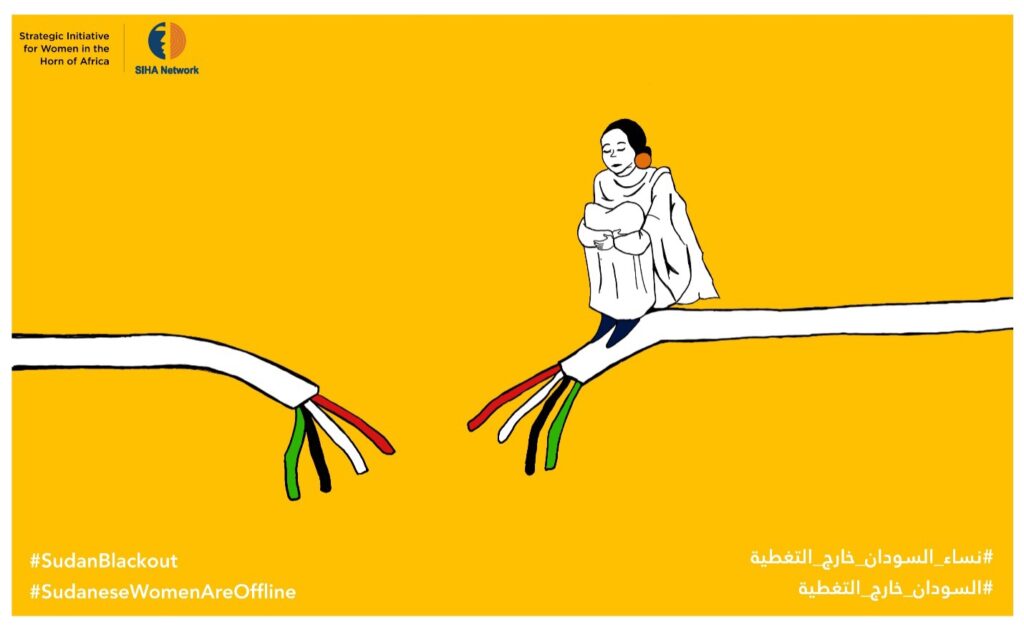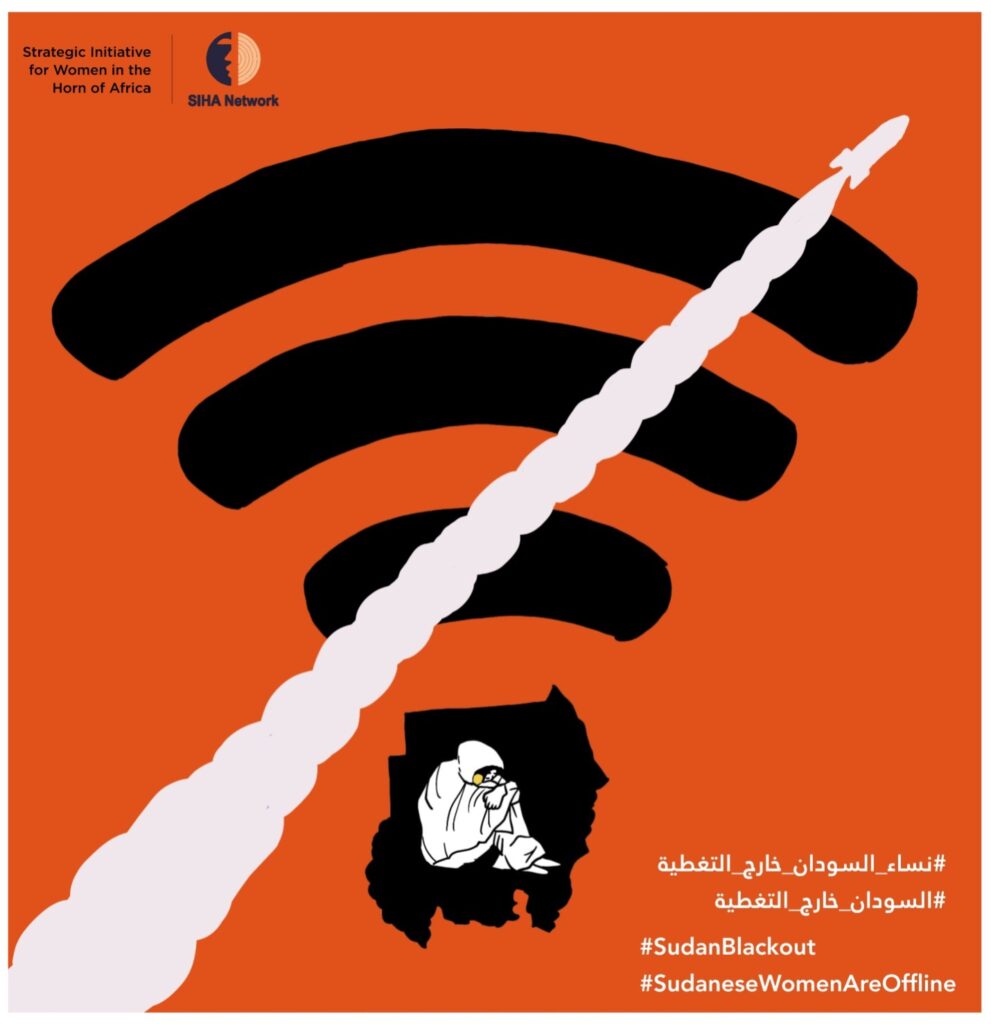
(Arabic below)
Following ten (10) months of horrific fighting in Sudan that have claimed thousands of lives, and led to enforced disappearances, forced evictions, and mass displacement; the people of Sudan are cut off from the outside world because of telecommunication outages, including disruptions to internet, calls, and data services.
Internet outages and blocking telecommunication networks are strategies the Sudanese Armed Forces (SAF) and the Rapid Support Forces (RSF) use to obstruct information flow in areas under oppositional faction control.
Locations primarily impacted include Darfur, Al-Gezira, Blue Nile, Khartoum, South Kordofan, and North Kordofan. Following a protracted six-day outage, only a few locations in the east and north have restored unreliable services.
The blackout started on February 2, 2024, in response to allegations that the RSF had taken over internet service providers (ISPs) data centers in Sudan’s capital, Khartoum. It persisted after the RSF knocked down MTN and Sudani’s switchboards in Khartoum and threatened to demolish further communication infrastructure if the telecom companies disobeyed their shutdown orders. SAF had reportedly cut off internet connectivity in Darfur for an extended time, prompting this action.
Since many Sudanese civilians and women rely on the internet and telecommunication for financial transactions, to purchase basic commodities and medications, and to access vital information about safe routes and health services, this situation has posed serious challenges to providing emergency relief, humanitarian aid, and protection efforts.
It should be noted that accessing telecommunication services is vital during times of crisis, for children, the elderly, people with disabilities, and other vulnerable populations, and it is a lifesaver for pregnant women to communicate with midwives and local health providers. Having access to telecommunication services is also critical for upholding the rights of women and vital for documenting and sharing reports on human rights violations and war crimes such as sexual violence and enforced disappearances.
The blackout in Sudan therefore represents a severe violation of human rights, since it has exacerbated an already serious humanitarian crisis marked by the loss of at least 13,000 lives and the internal displacement of over nine million people—the most significant internal displacement crisis globally. The agony endured by those impacted by the conflict is further worsened by the difficulty of communicating with family and loved ones and the inability to ascertain their location or state of well-being.
SIHA Network demands an immediate cessation of the widespread disruption of communication infrastructure and internet connectivity and urges that the warring parties be held accountable for these detrimental consequences. The international community must also promptly take action by aiding in the restoration of telecommunication services for Sudanese citizens and supporting the establishment of alternative means of communication to ensure their connectivity and access to essential services.

الوصول إلى خدمات الاتصالات حق ولا ينبغي استخدامه كسلاح في حرب السودان.
بعد عشرة أشهر من القتال المروع في السودان والذي أدى إلى مقتل آلاف الأشخاص وترويعهم وتهجيرهم واختفاء العديد منهم ومنهن قسريًا، تم قطع العلاقة بين شعب السودان والعالم الخارجي وما بين السودانيين داخل السودان بسبب انقطاع الاتصالات، بما في ذلك الإنترنت والمكالمات.
بدأ حجب شبكة الاتصالات في الثاني من فبراير ٢٠٢٤، وكانت المناطق المتأثرة بشكل أساسي تشمل دارفور، الجزيرة، النيل الأزرق، الخرطوم وجنوب وشمال كردفان. بعد انقطاع طويل استمر لأكثر من أسبوعين، عادت شبكة الاتصالات بشكل ضعيف ومتقطّع في مناطق متفرقة من شرق وشمال السودان، بينما ظلّت غالبية مناطق السودان خارج التغطية حتى اللحظة.
وقد بدأ هذا الحجب على خلفية أن الدعم السريع قد استولى على مراكز مزودي خدمات الاتصالات في العاصمة السودانية الخرطوم. واستمرت الأزمة بعد قيام الدعم السريع بتعطيل المحوّلات الخاصة بشبكتي MTN وسوداني في الخرطوم، كما هدد بتدمير المزيد من البنية التحتية للاتصالات إذا تمت مخالفة أوامرهم بإغلاقها. ووفقًا للتقارير، فإن الجيش السودانيّ قد قام بقطع الإنترنت في دارفور لفترة طويلة، مسببًا بذلك ردة الفعل هذه. الجدير بالذكر أن قطع الإنترنت وحجب شبكات الاتصالات هي استراتيجية تستخدمها القوات المسلحة السودانية وقوات الدعم السريع كسلاح حرب.
يعتمد السودانيون والسودانيات على الإنترنت وخدمات الاتصالات لإجراء المعاملات المالية وشراء السلع الأساسية والأدوية، والوصول إلى معلومات حول الطرق الآمنة والخدمات الصحية، لذلك فإن حجب شبكة الاتصالات يشكل خطرًا جسيمًا للغاية، إذ يعرقل جهود توفير المساعدات الإنسانية والإغاثة الطارئة والحماية.
إن الوصول إلى خدمات الاتصالات في أوقات الحرب مسألة حيوية لا غنى عنها، تحديدًا للمرضى والأشخاص ذوي الإعاقة والعجزة والأطفال والنساء الحوامل في التواصل مع القابلات ومقدمي الرعاية الصحية. شبكات الاتصال هي وسيلة جوهرّية للدفاع عن حقوق النساء والفتيات، وهي كذلك أداة أساسية لتوثيق انتهاكات حقوق الإنسان كالعنف الجنسيّ والاختفاء القسريّ، ولتقديم تقارير مباشرة حول هذه الجرائم.
إن الانقطاع المطول للاتصالات قد فاقَم كارثة السودان الإنسانية الخطرة، والتي تسببت بمقتل ما لا يقل عن ١٣,٠٠٠ شخص، ونزوح أكثر من تسعة ملايين شخصًا داخليًا – وهي أكبر أزمة نزوح داخلي في العالم – ويمثل حجب شبكات الاتصالات انتهاكًا خطيرًا لحقوق الإنسان، تتأثر به النساء بنسبةٍ أكبر.
المعاناة التي يعيشها المتأثرون بالحرب في السودان تزداد سوءًا بسبب صعوبة الوصول إلى المساعدات المالية والسلع الأساسية وعدم المقدرة على التواصل مع أسرهم وأحبائهم، وعدم القدرة على التأكد من مكانهم أو حالتهم الصحية.
نحن في شبكة صيحة نطالب بوقف فوري لانقطاع الاتصالات والإنترنت، وتدمير البنية التحتية للاتصالات ومحاسبة الأطراف المسؤولة عن هذه الجريمة ومآلتاها. يجب على المجتمع الدوليّ الاستجابة الفورية والضغط لإعادة الاتصالات والإنترنت فورًا وإتاحة بدائل للتواصل للسودانيين المتأثرين بالحرب.
#نساء_السودان_خارج_التغطية #السودان_خارج_التغطية
